Mid-Sized Job Shop Evolves into Global Web Provider for Sheet Metal Parts
Deeg GmbH, a German job shop for sheet metal processing, recently added a spin-off company -- LaserCloud -- to handle smaller, one-off orders placed online. What once was a small family business is now a global sheet metal provider.
Deeg GmbH is a mid-sized job shop for sheet metal processing. In business for nearly 30 years, and with a workforce of 185, the German manufacturer produces a diverse range of sheet metal parts in large series on laser cutting and bending machines.
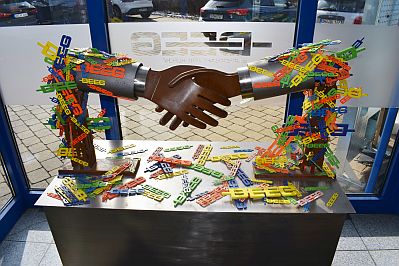
At Deeg, a job shop for sheet metal parts in Kirchberg an der Jagst, Germany, visitors are greeted with a laser-cut and bent sheet metal handshake.
The production area of 17,000 m² is equipped with cutting-edge machinery, primarily TRUMPF machines. Customers are mainly large industrial companies from the region who order medium to large series of 100 to 1,000 units made of structural steel, aluminum or stainless steel.
When Batch Size 1 Interrupts Series Production
Customers would repeatedly come to request smaller batch sizes or even a batch size of 1, for example, to have a prototype for product testing produced quickly. However, the laser machines are scheduled 7-8 days in advance for series production orders.
All production orders are planned and scheduled via ERP (APplus) and PPS (Oseon), "merged" with NC order data in close-to-production work prep, and then go directly to the machines. With synchronized production, the single and rush orders had to be managed without interrupting the series production.
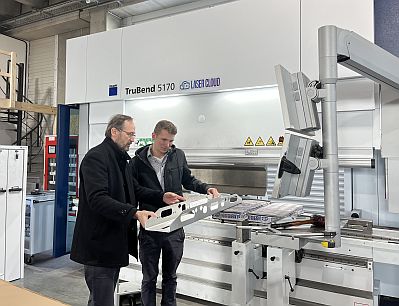
Joachim Deeg from LaserCloud (right) inspects a processed sheet metal part.
At times, this proved very challenging -- with full order books and often in three-shift operation. The time and effort involved was correspondingly high. "Our delivery times are between 6 and 8 weeks. So, as you can imagine, it was quite a balancing act to meet our deadlines when we had to squeeze in smaller series or prototypes," says Joachim Deeg, CEO of LaserCloud, the spin-off company founded to handle the urgent requests and the small batch orders.
Processing Individual Orders Separately
"We were eager to remedy the situation and needed a solution," recalls the Managing Director. Thus, it was decided to set up a separate, fully dedicated department. A new hall was built, and the company's own machinery was acquired in order to be able to manufacture individual orders separately from series production.
The aim was not to process these orders via the standard order entry system, but instead to be handled entirely separately, if possible, through an online platform. The new ordering philosophy at Deeg evolved as follows: If all you need is a simple bent part, you can order it via the web shop and have it delivered within a few days. Those who want to order full series can simply continue as usual via order processing.
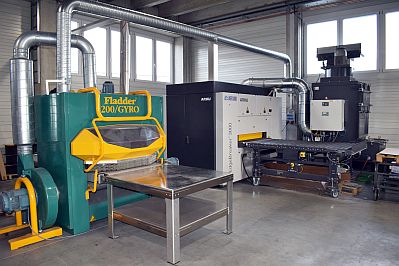
As online orders increase, there will still be space available in LaserCloud’s new production hall for more sheet metal processing machines.
The new department soon became its own company: LaserCloud GmbH. A TruLaser 3030 fiber laser cutting machine, a TruBend 5170 press brake, an Arku sheet metal deburring machine and a Fladder deburring machine were made available for the quick web orders.
"At LaserCloud, we are extremely flexible because we have our own machines. If a customer needs their sheet metal part the very next day, we can deliver," promises Deeg.
To ensure that a single order can be processed this quickly, the 15 employees at LaserCloud need to master all the machining processes required to completely manufacture a sheet metal part and then assemble it. At the parent company, there are separate departments for laser cutting, deburring, welding and bending. "We need exceptionally versatile employees who can handle everything. It's what enables us to deliver within just a few hours," explains LaserCloud's Managing Director.
Web Shop for Single Rush Orders
"At the time, I wondered why there wasn't any software available for a job shopper in sheet metal processing to create a web shop and handle the small batches and single parts online," said Deeg. Software developers acquainted with the junior CEO suggested that such a project would be a real money pit.
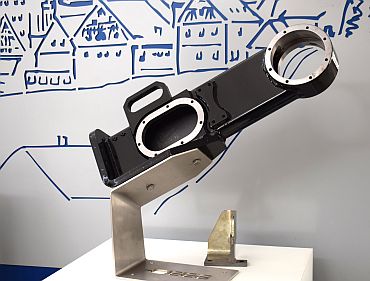
What Deeg produces in larger series, LaserCloud carries out for single orders: high-precision sheet metal processing.
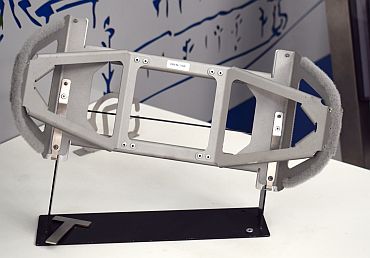
But Joachim Deeg wasn’t ready to give up. Customers insisted that they wanted to place the small orders with their long-standing sheet metal partner -- without, however, having to deal with long delivery times.
Through his contacts at TRUMPF, Deeg then became aware of RockIT Manufacturing as a potential web shop provider. The Ditzingen-based IT specialists, including former TRUMPF employees, create online shops for industrial companies -- and especially for sheet metal processors.
Once the web shop was designed for LaserCloud, online orders could be placed, but the design department still had to check the feasibility of each part. "What good is a digital ordering process if we have to intervene manually every time? The web shop then becomes a one-way street," points out Deeg. His vision was to integrate a running cost calculation for the many single orders -- along with a feasibility analysis -- into the web shop, so that everything could run as automatically as possible.
Specifications for the Feasibility Analysis
RockIT then integrated the cost calculation into the LaserCloud shop and referred to the Optimate start-up when it came to feasibility analysis. The cost calculation was quickly integrated, RockIT adapted the interface, as well as the link to the Optimate solution.
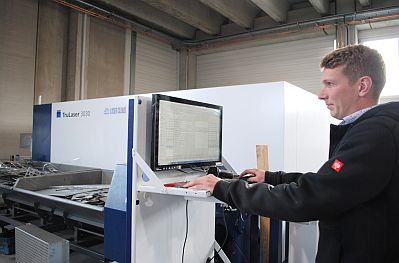
Joachim Deeg, CEO of LaserCloud GmbH, would like to see the results of a feasibility analysis visualized all the way to the machine.
"We had estimates of up to two years to integrate the feasibility analysis into our web shop," recalls Deeg. "But what manufacturing company can afford to wait two long years until the feasibility check for sheet metal parts is implemented in the web shop? Optimate doesn't think in terms of years, but in short sprints." The start-up's software development team was able to implement the first operational programs within two weeks.
A set of specifications defined what LaserCloud expected from a feasibility analysis. It was important to Deeg that there is both a design and a production check. "Our goal was that when feasibility was checked, i.e. once the part was ready to go, the stored STEP file could then be uploaded directly into our CAD program with a simple click to create the NC program."
Feasibility Means Design and Production Checks
If a web shop user uploads their part to the platform as a design drawing in STEP or DFX format, the first step is the feasibility analysis. Specifically, it checks whether the part can be produced in terms of design. The customer then enters their material and other parameters for the production test.
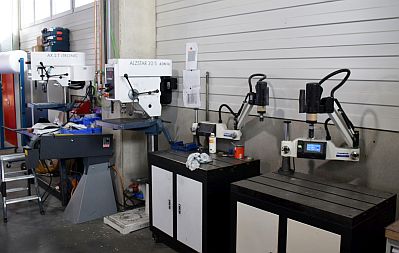
A number of smaller machines are available in the shop if a hole needs to be drilled or a thread needs to be cut in one of the single parts.
The sheet metal processor's machine and tool data were stored for just this purpose. Based on these characteristics, the digital feasibility analysis checks whether the ordered part can be produced with the machines at LaserCloud.
Initially, it was still unclear just how reliable this would be, and whether the orders would actually run as planned. Of course, nobody wanted half the parts to be rejected by the feasibility analysis. A balance had to be found. On the one hand, it was important not to reject too many online orders, but on the other, the company wanted to ensure that the parts that passed the feasibility check could actually be produced with a high level of reliability.
Should the Optimate feasibility analysis reject a part, it can be placed into a second shopping cart with non-calculable parts. In this case, an order isn't generated, and the design data and entered parameters are sent to the design department for manual checking.
Benefiting Twice from the Extended Workbench
The LaserCloud online shop was launched in October. Since then, orders have been coming in daily. 95 percent of them are new customers and none of them are existing customers of the parent company. 100 customers are currently registered, and the trend is increasing. One customer for whom the LaserCloud online ordering platform has served as an extended workbench now places 400 orders a week via the web shop -- all of them single parts with batch sizes of 1 to 5.
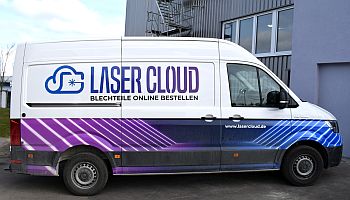
LaserCloud employees produce single and rush orders within as few as 2-3 days and may personally deliver the sheet metal parts.
In the medium term, job shopper Deeg also benefits from the new subsidiary. Anyone who orders single sheet metal parts from LaserCloud today may well become a high-volume customer tomorrow. Joachim Deeg explains: "If a new customer needs a prototype of one or two parts, for example, they can order them from us, receive their delivery within a few days and test them. If the tests run successfully and the customer wants to go into series production, our parent company is available to take it on."
Want more information? Click below.
Rate this article
View our terms of use and privacy policy